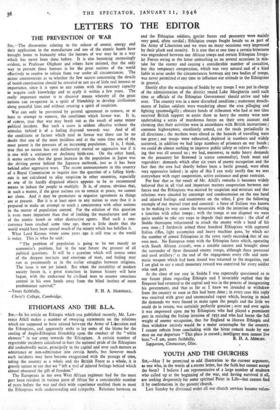ETHIOPIANS AND THE B.L.A.
SIR,—In his article on Ethiopia which you published recently, Mr. Law- rence Athill makes a number of sweeping statements on the relations which are supposed to have existed between the Army of Liberation and the Ethiopians, and apparently seeks to lay some of the blame for the cooling of Anglo-Ethiopian friendship upon the conduct of the "white element" in our army towards the Ethiopians. A certain number of regrettable incidents calculated to hurt the national pride of the Ethiopians did undoubtedly occur, principally in the capital and over such matters as admittance or non-admittance into certain hotels, but however much such incidents may have become exaggerated with the passage of time, taking the country as a whole and the British Force as a whole, it is grossly unjust to say that we "left a trail of injured feelings behind which almost obscured the gift of freedom."
The Europeans in my own West African regiment had for the most part been resident in various parts of Africa for a considerable number of years before the war and their wide experience enabled them to meet the Ethiopians with understanding and sympathy. Relations between us
and the Ethiopian soldiers, patriot forces and peasantry were mainly very good, often cordial ; Ethiopian troops fought beside us as part of. the Army of Liberation and we were on many occasions very impressed by their pluck and tenacity. It is true that at one time a certain bitterness was engendered between our African troops and certain Ethiopian Irregu- lar Forces owing to the latter ambushing us on several occasions in mis- take for the enemy and causing a considerable number of casualties, but this temporary exasperation, which was very natural and of a kind liable to arise under the circumstances between any two bodies of troops, was never permitted at any time to influence our attitude to the Ethiopians in generaL
Shortly after the occupation of Soddu by our troops I was put in charge of the administration of the district round Lake Margherita until such time as officials of the Ethiopian Government should arrive and take over. The country was in a most disturbed condition ; numerous detach- ments of Italian soldiers were -wandering about the area pillaging and fighting spasmodikally ; obscure bands of tribesmen who had at one time received British support to assist them to harry the enemy were now undertaking a series of murderous forays on their own account and claiming that their activities were in accordance with British instructions ; common highwaymen, excellently armed, cut the roads periodically in all directions ; the markets were closed as the hazards of travelling were too great ; our troops were exhausted, depleted in numbers and widely scattered, in addition we had large numbers of prisoners on our hands ; we could do almost nothing to improve public safety or relieve the suffer- ing that was all around us ; we had, moreover, to make heavy demands on the peasantry for firewood (a scarce commodity), fresh meat and vegetables: demands which after six years of enemy occupation and the fact that the area had shortly before been a battle ground, were often very oppressive indeed ; in spite of this I can truly testify that we met everywhere with eager cooperation, active assistance and great restraint.
For fear that as the, result of Mr. Athill's remarks it becomes widely believed that in all vital and important matters cooperation between our forces and the Ethiopians was marred by suspicion and mistrust and that relations were clouded by contempt and condescension on the one hand and injured feelings and resentment on the other, I give the following example of our mutual trust and concord: a force of Italians was known to be making its way across the mountains with the intention of effecting a junction with other troops ; with the troops at our disposal we were quite unable to take any steps to iinpede their movements : the chief of Soddu thereupon volunteered to attack the enemy with a band of his own men ; I forthwith armed three hundred Ethiopians with captured Italian rifles, light automatics and heavy machine guns, by which act the number of armed Ethiopians in the town vastly exceeded that of our own men. No European went with the Ethiopian force which, operating with South African aircraft, won a notable success and brought about the surrender of three thousand enemy troops, although these possessed and used artillery: at the end of the engagement every rifle and auto- matic weapon which had been issued was returned to the magazine, and I am glad to say a small monetary reward was contrived for every soldier who took part.
At the close of our stay in Soddu I was repeatedly questioned as to our future plans regarding Ethiopia and I invariably replied that the Emperor had returned to the capital and was in the process of inaugurating his government, and that as far as I knew we intended to withdraw from the country as soon as this had been done ; in every case this reply was received with great and unconcealed regret which, bearing in mind the demands we were forced to make upon the people and the little we could do in return, was certainly perfectly genuine ; over and over again it was impressed upon me by Ethiopians who had played a prominent part in resisting the Italian invasion of 1935 and who had borne the full weight of enemy occupation, that for England to liberate Ethiopia and then withdraw entirely would be a major catastrophe for the country. I cannot refrain from concluding_ with the bitter remark made by one man on our departure "This place is cursed ; intelligent men cannot live






























 Previous page
Previous page